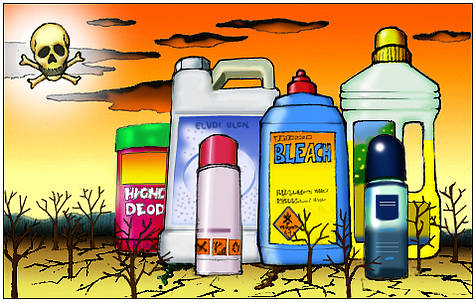
PARTIAL LIST - Here a just a few examples of items that are convenient, yet often contain harmful chemicals :
Personal Care Products
soap and body-wash
Shampoo
Cosmetics
Toothpaste
Sunscreen
Household Items
Laundry detergent
Carpeting
Air fresheners
Bedding
Electronice Devices
Cell phones
Microwave ovens
Bluetooth headphones
Food and Drink
Snack foods
Dairy products
Energy Drinks
Nutritional Supplements
Random Things
Jeans
Dental Floss
Diapers
Dry Cleaning Chemicals.
A Good Question to Ask
A good first question to ask whenever considering any product: Is it found in nature, more of less in this form? If the answer is yes, it's probably safe. If the answer is no, proceed with caution.
Our Chemical Romance
Everything contains chemicals. Water and air are made of chemicals. Trees, grass and flowers are made of chemicals. But it's the unnatural chemicals that should worry us, the new ones that are constantly being created in industrial labs for commercial uses. There are more than eighty thousand in existence and only a small number of which are ever tested for safety.
Products designed for beauty and hygiene often contain harmful chemicals like parabens, phthalates, and sulfates. Parabens, used as preservatives, mimic estrogen and have been linked to reproductive issues and certain cancers. Phthalates, often tucked under ambiguous labels like “fragrance,” disrupt hormones and may impact development or metabolism. Sulfates, responsible for foam in soaps and shampoos, strip natural oils and can produce carcinogenic byproducts during manufacturing.
In response to these risks, Olien advocates for a smarter, more conscious approach: becoming diligent label readers and opting for natural, transparent alternatives. He emphasizes seeking products free from the so-called “toxic trio,” and instead relying on plant-derived ingredients like essential oils and botanical extracts. This shift not only protects our health but reinforces the core message of the book: convenience isn’t worth the hidden cost if it undermines long-term well-being.
The Hidden Dangers in Personal Care Products
-
 Many everyday products contain harmful chemicals like parabens, phthalates, and sulfates, which can disrupt hormones and impact long-term health.
Many everyday products contain harmful chemicals like parabens, phthalates, and sulfates, which can disrupt hormones and impact long-term health. -
 Parabens mimic estrogen and are linked to hormone-related cancers and fertility issues.
Parabens mimic estrogen and are linked to hormone-related cancers and fertility issues. -
 Phthalates, often hidden under the label "fragrance," are known endocrine disruptors that can affect reproduction and development.
Phthalates, often hidden under the label "fragrance," are known endocrine disruptors that can affect reproduction and development. -
 Sulfates, used to create lather, can irritate skin and strip natural oils—and may leave behind toxic residues from the manufacturing process.
Sulfates, used to create lather, can irritate skin and strip natural oils—and may leave behind toxic residues from the manufacturing process. -
 The FDA and other agencies do not require full disclosure of ingredients in personal care products, leaving consumers in the dark.
The FDA and other agencies do not require full disclosure of ingredients in personal care products, leaving consumers in the dark. -
 Olien encourages using natural, plant-based alternatives with transparent labeling and safe, non-toxic ingredients.
Olien encourages using natural, plant-based alternatives with transparent labeling and safe, non-toxic ingredients. -
 Swapping out harmful personal care products is one of the easiest and most powerful ways to reduce daily toxic exposure.
Swapping out harmful personal care products is one of the easiest and most powerful ways to reduce daily toxic exposure. -
 This reinforces the book’s core idea: “Just because it’s convenient doesn’t mean it’s safe.”
This reinforces the book’s core idea: “Just because it’s convenient doesn’t mean it’s safe.”
Product Spotlight
Natural Based Cleaner
Say goodbye to grime — without the harsh chemicals.
Culleoka’s Natural Based Cleaner is powered by our Probiotic Formula to break down dirt, grease, and buildup while being gentle on every surface.
Safe for homes, offices, and facilities
Eco-friendly and non-toxic
Tough on mess, kind to the planet
Clean with confidence. Clean the natural way.
Pure Clean, Naturally.
NEED HELP WITH AN ORDER OR HAVE QUESTIONS:EMAIL: sonnyhobbs@culleokacompany.com
God Bless,
~Sonny Hobbs,
Founder
Culleoka Company, LCC
About Us (culleokacompany.com)




